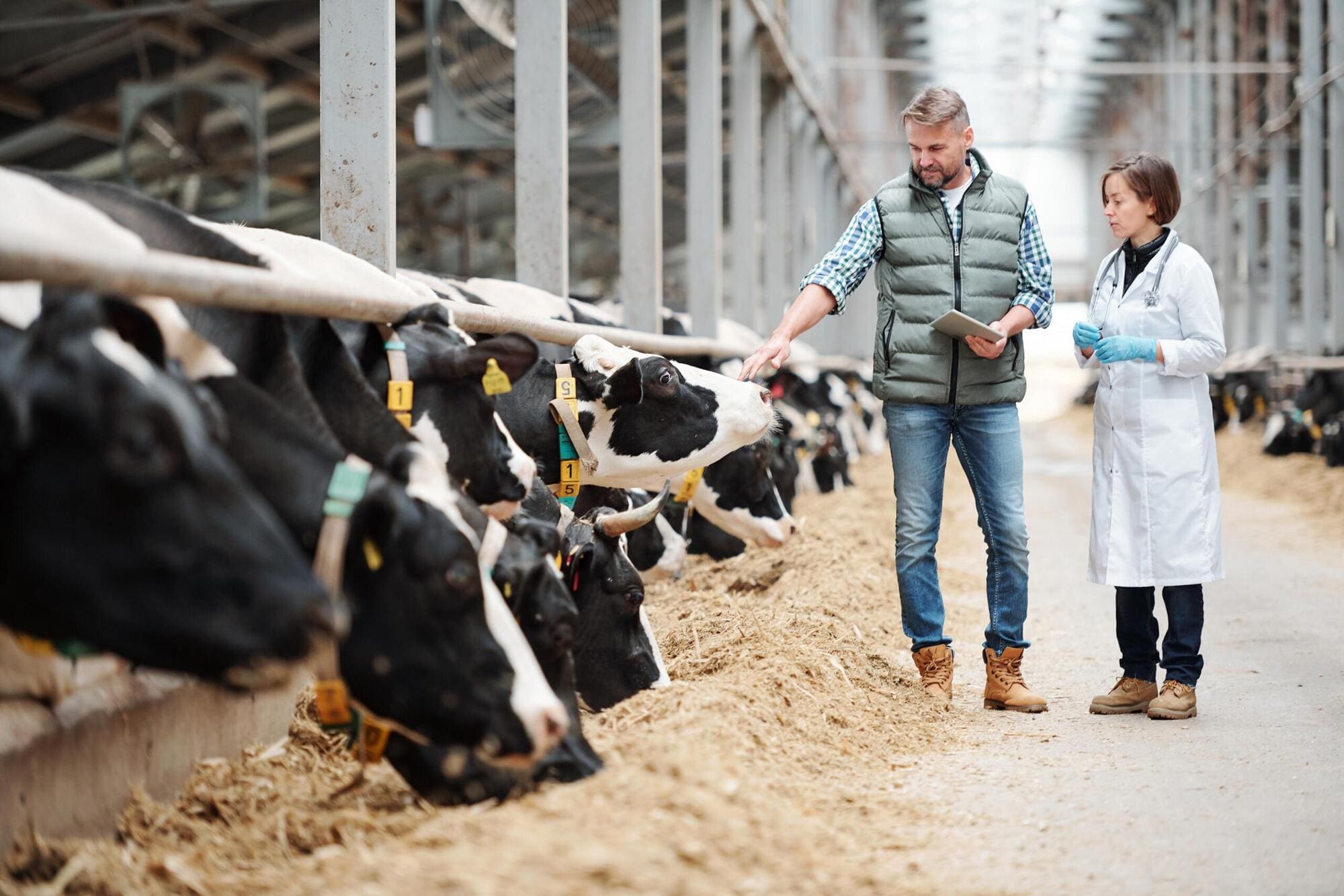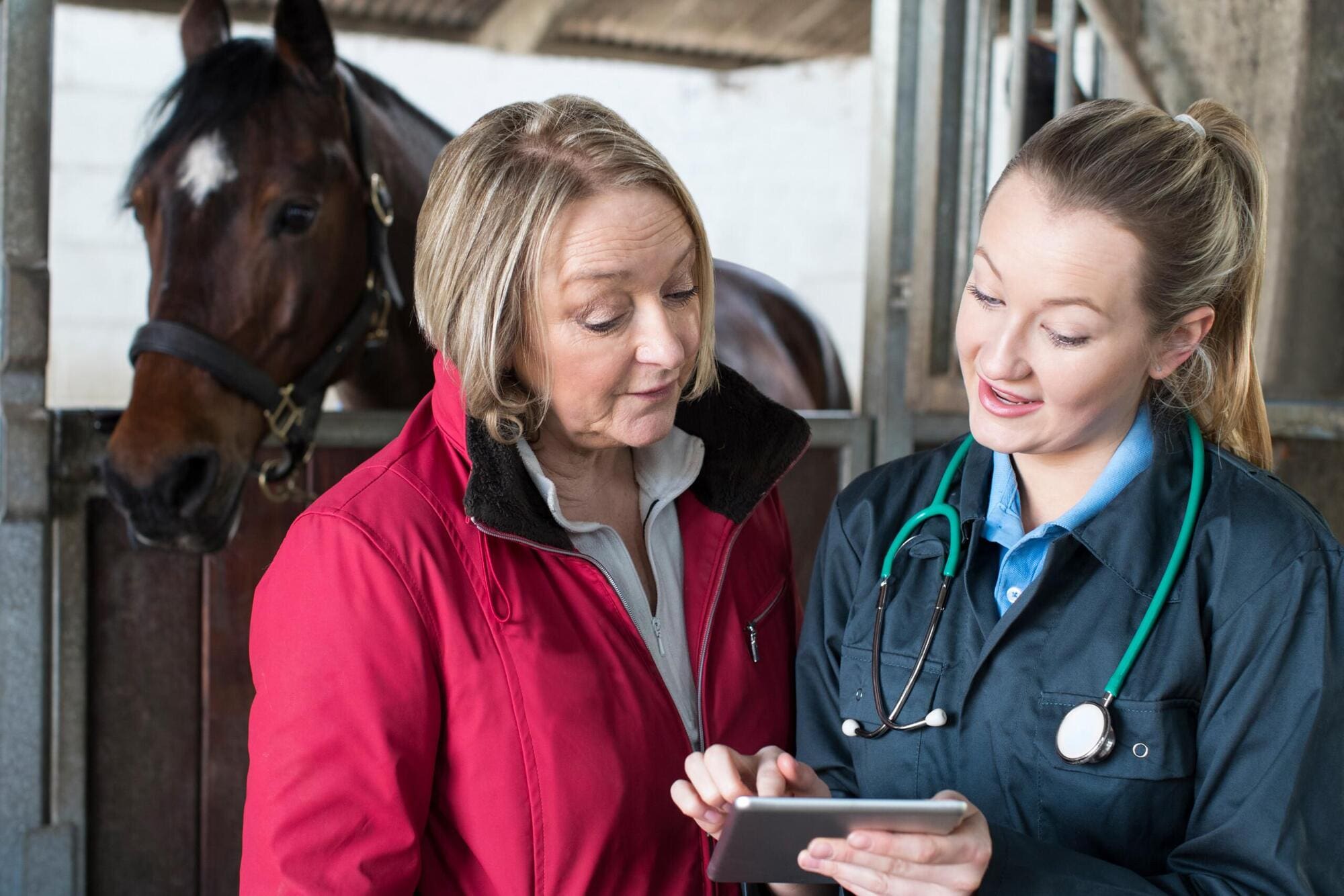In this Vet Career Guide
What Does a Vet Do?
A vet is sometimes also known as a veterinarian or veterinary surgeon. They look after animals’ health and welfare by diagnosing their illnesses and injuries and providing appropriate medical care, treatments and sometimes surgeries. They also advise owners and keepers on the best ways to look after their animals.
Vets can specialise in working with domestic, farm, wild or zoo animals or generalise and work with all types. They may focus on caring for specific animals, such as horses, and can also specialise in different areas of veterinary medicine, e.g. cardiology. Therefore, what a vet does will depend on their specialisms.
A vet’s main aim is to prevent sickness and disease to ensure animals have optimum health and welfare. They will carry out many tasks, including handling and examining animals, making diagnoses, providing appropriate treatments, giving advice to owners, taking samples for analysis, conducting X-rays and scans, administering an anaesthetic, performing operations, neutering animals, putting animals to sleep, etc. The role may also involve administrative and computer work, e.g. updating treatment records and insurance paperwork.
Vets mainly work in veterinary practices and surgeries, which can be in cities, towns and villages. They are also likely to visit other places to see animals, such as homes, farms, stables and zoos. They will work with many people, including other veterinary surgeons, veterinary nurses and support staff. They will also liaise with external stakeholders, such as clients (owners), farmers, animal keepers, specialists, laboratories, suppliers, insurance professionals, regulators, etc.
Vets can work for many employers, such as private veterinary practices, specialist practices, charities, the Armed Forces, zoos, animal hospitals, research facilities, government agencies and pharmaceutical companies. They can also be self-employed and have their own practice or work as a locum.

Responsibilities
A vet’s responsibilities will depend on where they work and their specialisms.
Some examples of common duties for vets can include (this list is not exhaustive):
- Complying with public health and hygiene laws.
- Meeting and consulting with animal owners and keepers.
- Conducting home visits.
- Handling, examining, diagnosing and treating injured and sick animals.
- Advising owners, farmers and keepers on the best ways to look after their animals, including how to prevent disease.
- Conducting routine health checks, treatments and vaccinations.
- Taking samples, e.g. blood, and conducting analyses.
- Conducting X-rays and various scans.
- Administering and managing anaesthetic.
- Performing operations.
- Caring for animals admitted into veterinary hospitals.
- Neutering animals to stop them from breeding and to prevent overpopulation or disease.
- Inserting microchips into animals for identification purposes.
- Putting animals to sleep that are beyond treatment, e.g. terminally ill.
- Supervising veterinary nurses and support staff.
- Referring animal patients to other specialists.
- Completing treatment records and other paperwork, such as insurance claim forms and travel documents.
- Keeping records maintained and up to date.
- Being on call in an emergency.
If a vet is a practice partner, they may also be responsible for finances, budgeting, contracts and recruitment.
Working Hours
A vet can expect to work around 40–45 hours a week, but they can do more or fewer hours depending on where they work and their specialisms.
Being a vet is not a 9–5 job. They will need to work unsociable hours, e.g. evenings, weekends and bank holidays. Vets usually have to be on call for emergencies, so they may have to work nights, especially if they are farm vets.
Some vets will travel to different sites and locations to see animals, which can lengthen their working day. Overnight stays may be necessary for some circumstances, and there may be overseas opportunities for some vets.

What to Expect
There are many positives to being a vet, especially if an individual is a caring person who loves helping animals. It is rewarding, as vets will diagnose, treat and help animals live longer, healthier, happier lives. They can go home at the end of the working day knowing their job makes a positive difference to animals and the people who look after them.
Vets can work anywhere in the country and even overseas, and there are many specialist areas. The salary is competitive compared to other career choices, even at the entry level. However, it does reflect the education, training and skills needed for the role. Salaries can increase with experience and specialist knowledge.
There are opportunities for vets to be self-employed and have their own practices. Being self-employed and being your own boss can be attractive, as it can give individuals the independence to take charge of their career progression.
Boredom will never be a problem for vets, and no two days will be the same. They will see, diagnose and treat various animals with different conditions and issues. One moment, they could be carrying out routine health checks and vaccinations; the next, they may face an emergency. Vets will also meet lots of different people every day and may get to travel to various places.
Even though there are positives to being a vet, there are challenges and cons, e.g.:
- Mental demands – being a vet is not for the faint-hearted, as it can be a mentally demanding role. Individuals will need to cope with seeing sick and injured animals, putting animals down and grieving owners, which can be distressing and upsetting. They will also have to think fast in an emergency, make difficult decisions and carry out life-saving operations, which can be stressful.
- Physical demands – being a vet can also be physically demanding, and individuals need to be physically fit. They will often have to work long and unsociable hours. Some may work outside and be on their feet for long periods, sometimes in all weathers. They may also need to lift and hold struggling animals and may also need to access them in cramped spaces, at height or in other challenging situations.
- Health and safety risks – vets will face many hazards during their work, such as aggressive animals (biting, scratching, kicking, etc.), bodily fluids, parasites and pests, diseases/infections, radiation (X-rays), hazardous substances (i.e. pesticides, medicines, cleaners, disinfectants, anaesthetic, gases and others), manual handling, use of tools, equipment and machinery, noise, vibration, slips, trips and falls, work at height, etc. The risk is higher for vets working on farms or at zoos where they handle large animals. Any animal allergies are likely to make the job harder, but there are specialist areas individuals could consider to avoid triggers.
- Training, competition and costs – becoming a vet can take up to six years. Therefore, individuals must prepare for an intense period of study, work-based learning, tests, exams and registration. Entry into veterinary school is also fiercely competitive, and there are no guarantees that an individual will be successful. They will need to stand out from the crowd and work hard to be successful in this career. University degrees are expensive, but individuals may be able to get a student loan or bursary.
Every career choice has pros and cons, and individuals must know what to expect before deciding whether it is a suitable role. The role is physically and mentally demanding, and vets face many health and safety risks. There is also a lot of competition. However, there are many positives too. Individuals who become vets love caring for animals and ensuring they are healthy and happy.
When considering whether to be a vet, individuals should look at the pros and cons. They should also ensure they have the right personal qualities to carry out the role and responsibilities required.
Personal Qualities Needed To Be A Vet
Some of the personal qualities a vet requires will include (this list is not exhaustive):
- The ability to use IT and software packages.
- A passion for animals and their health, well-being and welfare.
- An interest in veterinary science and medicine.
- Good physical fitness.
- Caring, calm, compassionate, approachable, understanding, sensitive and empathetic.
- Confident, assertive, honest and trustworthy.
- Knowledge of animal biology, medicine and dentistry.
- Knowledge of public health and hygiene laws.
- Excellent communication skills, both written and verbal.
- Interpersonal skills.
- Customer service skills.
- Scientific and technical skills.
- Analytical and problem-solving skills.
- Practical skills.
- Research and investigation skills.
- Business management skills (partners).
- Judgement and decision-making skills.
- Organisational and time management skills.
- Being thorough, accurate and having excellent attention to detail.
- The ability to work well with others and alone using own initiative.
- The ability to work under pressure, be patient and remain calm in stressful situations.
- The ability to present complex information simply and concisely.
- The ability to be flexible and adapt to change.
- The ability to accept criticism.
- The ability to work well with their hands.
- The ability to cope with injuries, illnesses and putting animals to sleep.
- The ability to be emotionally resilient.
Qualifications
To become a vet, individuals must complete a veterinary degree approved by the Royal College of Veterinary Surgeons (RCVS). Unlike other undergraduate degrees, which usually take three years full-time, veterinary degrees take five to six years. Individuals could complete the degree in four years if they already have a minimum of a 2:1 degree in a related subject.
To be accepted for a veterinary undergraduate degree, individuals will typically require the following:
- Five GCSEs grades 9 to 4 (A* to C) (or equivalent), including English, maths and sciences.
- Three A levels (or equivalent), e.g. biology and chemistry.
Some universities may ask individuals to pass tests and complete questionnaires. Getting a placement at veterinary school is highly competitive, and some institutions may also require a personal statement and interview. The grades and tests will depend on the university entry requirements, and individuals should check before applying. The Veterinary Schools Council UK and the British Veterinary Association (BVA) have further information on admission processes and entry requirements on their websites.
Registration
After completing an approved veterinary degree, individuals must register with the Royal College of Veterinary Surgeons (RCVS) to practise veterinary medicine in the UK. They must also renew their registration annually. There is a cost for initial registration and renewal.
Vets who have achieved an overseas qualification will still need to register with the RCVS to practise legally. They will also need to sit and pass the Statutory Membership Examination if they are from certain countries. The RCVS has further information on their website.

Work Experience
As entry into veterinary school is highly competitive, individuals should undertake relevant and varied work experience (either paid or voluntary) to increase their chances of being accepted and getting a job after graduation. Where possible, individuals should try and obtain work experience that involves working in a veterinary practice. Practical experience helps individuals understand what is involved in working in a veterinary setting, builds their knowledge and skills, and allows them to appreciate the emotional and physical demands of the job and environment.
Alternatively, individuals could get experience in handling various animals in the following settings:
- Farms.
- Smallholdings.
- Zoos.
- Wildlife rescue centres.
- Sanctuaries.
- Kennels.
- Catteries.
- Stables.
- Animal welfare centres.
Some roles may be paid jobs, but most will be voluntary. Animal charities, e.g. the PDSA, the RSPCA and the Blue Cross, have volunteering roles. There is also information on volunteering and local opportunities on Do-IT, NCVO, Volunteering Matters and Indeed.

Training Courses
Learning does not stop with experience or once someone becomes qualified. Attending relevant training courses and having additional certifications can help individuals enter the profession, enhance their employability and give them a competitive edge. Many colleges and accredited private training companies can provide relevant training courses.
Some examples of courses that may be useful for individuals looking at a career in veterinary include (this list is not exhaustive):
- Hazardous substances.
- Manual handling.
- Noise and vibration.
- Slips, trips and falls.
- Work at height.
- Work equipment (PUWER).
- Work-related stress.
- Personal protective equipment (PPE).
- Workplace first aid.
- Data protection and the GDPR.
- Customer service skills.
- Time management skills.
- Needles and sharps.
Individuals could also consider college courses to gain further knowledge and experience with animals, e.g., animal care/management or dog grooming.
Professional bodies, councils, unions, charities and associations, such as the Royal College of Veterinary Surgeons (RCVS), the British Veterinary Association (BVA), the Veterinary Schools Council UK, the Institute of Registered Veterinary & Animal Physiotherapists UK (IRVAP), the British Small Animals Veterinary Association (BSAVA), the British Equine Veterinary Association (BEVA), and others, can also advise on reputable training courses. Some also provide memberships, events and support to help individuals become vets and give those already in the profession the means to continue their professional development.
The type of training required will depend on who an individual works for and their specialisms. It is worth looking at several job advertisements to identify the training needed for roles. Jobs can be found on websites such as GOV.UK find a job service, Indeed, LinkedIn, Glassdoor, Vet Record Careers, The Vet Service, VetClick, Vet Times Jobs, VetSurgeon.org and others. Also, look at the Royal Army Veterinary Corps and recruitment agencies, e.g. NSV Veterinary Recruitment and Recruit4Vets.
More relevant training and competence (skills, experience and knowledge) will open up more opportunities. Refresher training is also advisable as it is a legal requirement, keeps knowledge and skills up to date, and is necessary for maintaining registration.
Criminal records checks
Vets may need a criminal record check. The organisation that holds criminal records will depend on the country within the UK.
For example:
- England and Wales – Disclosure and Barring Service (DBS).
- Northern Ireland – AccessNI.
- Scotland – Protecting Vulnerable Groups (PVG) scheme.
Driving
Most vets will need a full driving licence (preferably with no points), as they will travel to different locations to see animals. Some roles will provide a company vehicle for this, but others may require individuals to use their own, which must have business insurance.

Where Do Vets Work?
Vets can work for many different employers in urban or rural locations, for example (this list is not exhaustive):
- Private mixed veterinary practices (run by one employer or a chain).
- Specialist veterinary practices, e.g. small animals, livestock or horses.
- Veterinary centres.
- Animal hospitals and clinics.
- Zoos, aquariums and animal parks.
- Animal charities.
- Government agencies.
- Pharmaceutical companies.
- Academic and research institutions.
- The Armed Forces.
Vets can also be self-employed and have their own practice or do locum work from their base.
During their day-to-day duties, vets can work in some of the following locations (depending on their specialisms):
- Consultation rooms.
- Theatre (performing surgeries).
- Laboratories.
- Farms.
- Smallholdings.
- Stables.
- Kennels and catteries.
- Zoos.
- People’s homes.
- Offices.
- Outdoors in other locations, e.g. urban areas, fields and parks.
There may also be options to work overseas for some individuals.

How Much Do Vets Earn?
What a vet earns is highly variable and will depend on the following:
- Their role and specialisms.
- Their location (those in London will earn more).
- The size of their practice.
- Their qualifications, training and experience.
- Who they work for.
- Whether they are employed, self-employed or work as a locum.
- Whether they are a practice partner.
Some examples of average salaries include (these figures are a guide only):
- Vets with less than two years of experience – £35,022 a year.
- Vets with between two and five years of experience – £43,970 a year.
- Vets with five years or more experience – £55,743 a year.
- Day rate for locum vets – £449 per day.
Vets can also receive bonuses in addition to their salaries.

Types Of Vet Roles To Specialise In
Vets can choose to be salaried and work in different types of veterinary practices. They can also have their own practice or carry out locum work.
They can also specialise in specific areas of veterinary medicine, such as (this list is not exhaustive):
- Cardiology – specialising in disorders of the heart and cardiovascular system.
- Dentistry – specialising in animal dental health and diseases.
- Dermatology – specialising in the skin and its various conditions.
- Emergency care – specialising in emergencies, such as serious accidents and life-threatening illnesses. These types of vets offer 24/7 services and are usually on-call.
- Neurology – specialising in conditions affecting the brain, spinal cord, muscles and nerves.
- Oncology – specialising in cancer diagnosis and treatment in animals.
- Orthopaedics – specialising in orthopaedic (musculoskeletal) conditions and diseases.
- Radiology – specialising in medical imaging, e.g. X-rays, to diagnose and treat animal injuries and diseases.
- Surgery – specialising in performing operations and invasive medical treatments.
Vets can also specialise in treating specific animals, such as (this list is not exhaustive):
- Horses – also known as equine vets. They diagnose and treat horses and also donkeys.
- Small animals – specialise in diagnosing and treating small animals, such as dogs, cats, rabbits, guinea pigs and reptiles.
- Livestock – also known as farm vets. They specialise in large farm animals, including cattle, sheep, goats, alpacas, pigs, horses, etc. Vets can also specialise in unusual livestock, such as honeybees and salmon.
- Exotic animals – specialise in animals, such as snakes, lizards, tortoises, turtles, frogs, spiders, some bird species, unusual mammals, etc.
- Raptors – specialise in birds of prey, such as falcons.
- Zoo animals – these vets look after various animals kept in zoos and aquaria.
- Wildlife – specialise in wild mammals, birds and other species.
The RCVS has a list of specialists on their website, which can give individuals more information on other roles available.
All specialist vet roles will require differing knowledge, skills, experience and qualities. Some may need specific qualifications, e.g. postgraduate and additional training, for specialised areas. Vets need to know how to diagnose and treat different animal illnesses and injuries, advise owners and keepers, prescribe medications and treatments, perform medical procedures, make difficult decisions and maintain notes and records. Any additional areas of expertise will depend on what an organisation is looking for (if employed) and the type of work a vet wants.
If vets do not carry out their role effectively and competently, it can cause an animal’s illness or injury to worsen or not be detected and may even cost lives. It can also affect a vet’s reputation. In serious cases, they may be struck off the RCVS register and can no longer practise as a vet. Therefore, whatever the type of role, vets must have the necessary competence to carry out the work professionally and safely. They should also know the limits of their competency, i.e. asking for help when something is beyond their expertise.

Professional Bodies
Standards, treatments, medicines, laws and technologies are regularly changing. Therefore, vets must keep abreast with the latest developments and changes to ensure they carry out their roles effectively, safely and correctly. Continuing professional development (CPD) gives vets the knowledge and skills to keep up to date with these changes, understand their responsibilities, and progress in their careers. It also helps them to stay registered with the RCVS, as CPD is a mandatory requirement.
Joining a professional body, council, charity, union or association, such as the Royal College of Veterinary Surgeons (RCVS), the British Veterinary Association (BVA), the Veterinary Schools Council UK, the Institute of Registered Veterinary & Animal Physiotherapists UK (IRVAP), the British Small Animals Veterinary Association (BSAVA), the British Equine Veterinary Association (BEVA) and others, can help individuals enhance their skills and overall career. They may offer different levels of membership, CPD, support, access to industry contacts and networking events.
There is ample opportunity for career progression for vets. They could do RCVS-approved postgraduate qualifications and specialise in particular animals, e.g. horses or wild animals, and areas, such as cardiology or neurology. With more training and experience, vets could move from a small veterinary practice to a large one or become senior vets. Alternatively, they could become a partner in a veterinary practice, set up their own clinic/be self-employed or work as locum vets.
Knowledge, skills and experience in veterinary medicine can also lead to a career in different areas. For example, a vet may want to work in education and training, clinical research and development. They may also work in other sectors, such as the Armed Forces or the pharmaceutical industry.

















